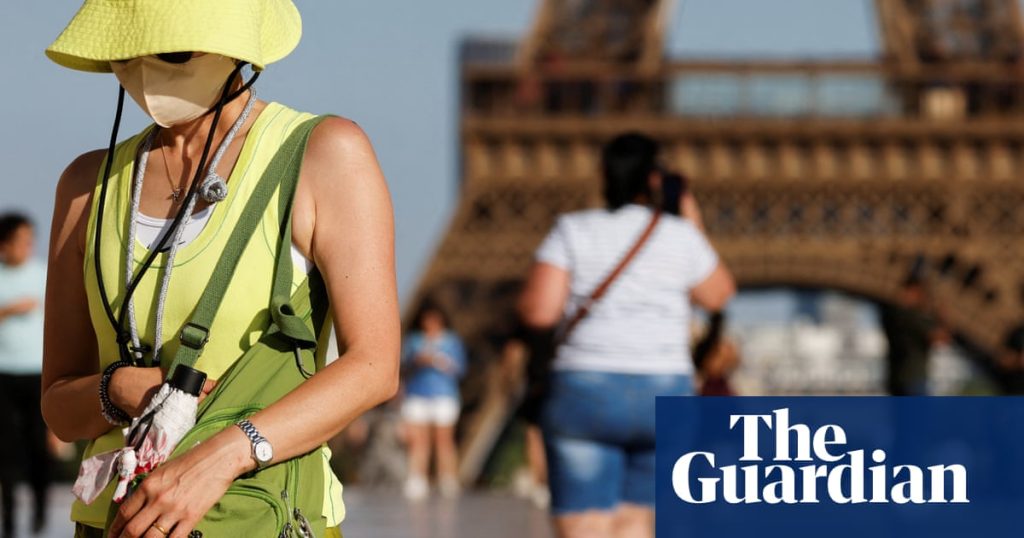The European heatwave has moved east, threatening record temperatures in Germany, as a political row broke out in France over air conditioning.
The French far-right leader Marine Le Pen seized a canvassing opportunity before the 2027 presidential election, announcing she would launch a “grand plan for air conditioning” for the nation if she won power.
In parliament, Le Pen, an MP for the Pas-de-Calais in northern France, said “air conditioning saves lives”. She said there was a problem in France if public services “are unable to function because of a lack of air conditioning, unlike dozens of countries across the world”.
Éric Ciotti, a Le Pen ally, put down a bill in parliament this week calling for “obligatory air conditioning” for key public spaces.
France has a low number of public spaces and private homes with air conditioning compared with neighbouring countries such as Italy. In 2020, 25% of French homes had air conditioning, compared with 14% in 2016, according to the national environment agency, Ademe.
The government attacked the far right as ignorant and “incompetent” for suggesting air conditioning was a solution to the climate crisis. The environment minister, Agnès Pannier-Runacher, said air-conditioned spaces in care homes for elderly people had been obligatory in France for 20 years. She said that, although vulnerable people should be protected from the heat, air conditioning “must not be installed everywhere” because it generated a rise in temperatures outside and was “the wrong answer”.
The Green leader, Marine Tondelier, attacked Le Pen for an environmental policy limited to “buying air conditioning units”. Tondelier said there had to be progress made on green spaces in cities and proper insulation of buildings.
Meanwhile, Europe continued to grapple with a deadly heatwave that has resulted in record temperatures and several deaths.
In Spain, officers from Catalonia’s regional police force, the Mossos d’Esquadra, were investigating the deaths of two farm workers whose bodies were found on Tuesday by firefighters tackling a wildfire near the town of Coscó in Lleida province. The wildfire burned through 6,500 hectares (16,000 acres) of land in the north-eastern Spanish region and authorities ordered 18,000 people in the area to remain at home.
The regional president, Salvador Illa, urged people to take extra care, warning them not to underestimate the speed and ferocity of wildfires.
“These fires aren’t like the ones we used to have,” he said on Wednesday. “When you find out how they evolve, you get goose bumps. There are really dangerous fires.”
The two men died on the same day that a young boy died, apparently from heatstroke, after being left in a car in the Catalan province of Tarragona on Tuesday.
France’s energy minister reported two deaths with a direct link to the heatwave, with 300 people taken to hospital this week.
A 70-year-old lorry driver was found dead inside his vehicle in northern Italy, in what may be the country’s third death linked to the heatwave.
The man was discovered shortly after 6.30am on Wednesday, parked at a motorway rest area between Sirmione and Peschiera del Garda, in the province of Brescia.
Sign up to Headlines Europe
A digest of the morning’s main headlines from the Europe edition emailed direct to you every week day
Privacy Notice: Newsletters may contain info about charities, online ads, and content funded by outside parties. For more information see our Privacy Policy. We use Google reCaptcha to protect our website and the Google Privacy Policy and Terms of Service apply.
after newsletter promotion
Elsewhere in Italy, traffic lights stopped working, people got stuck in lifts, and shops closed early after power cuts in parts of the country on Tuesday afternoon, partly due to a surge in the non-stop use of air conditioning and fans putting a strain on electricity grids.
The blackouts in Italy were also caused by underground electrical cables overheating, according to the energy provider Enel. In Florence, the power cut affected the city’s historic centre, with the La Rinascente department store evacuated as a precautionary measure. A sign reading: “Black out, see you tomorrow morning at 10am,” appeared on a shop window opposite Florence’s cathedral. Homes were without electricity for hours in several neighbourhoods in Rome, Milan, Genoa and Bergamo.
Italy’s health ministry issued a maximum red alert for heat in 18 cities on Wednesday, meaning the heat is so intense that it poses a risk for young and healthy people too. The extreme temperatures are forecast to last at least until the weekend.
The heat is also beginning to take a serious toll on the country’s agriculture, scorching fruit and vegetables, straining livestock, and deepening a growing drought crisis in the south.
According to Coldiretti, Italy’s largest farmers’ association, early signs of damage are already being reported from north to south: from blistered melons in Tuscany to milk shortages in Lombardy and water rationing in Sicily.
As the heatwave rolled eastwards on Wednesday, Germany was expected to record some of its hottest temperatures of the year so far. Temperatures were expected to surge close to 40C across much of the country on Wednesday, and could break the all-time record for Germany of 41.2C, set in July 2019.
Drought-like conditions led more than 40 German districts to restrict water use, including for farmers and gardeners, in addition to dozens of municipalities calling on citizens to conserve water.
In Brandenburg state surrounding Berlin, two forest fires broke out on Tuesday, with high temperatures and munitions in the soil complicating the work of firefighters, who by the evening had the situation under control.

